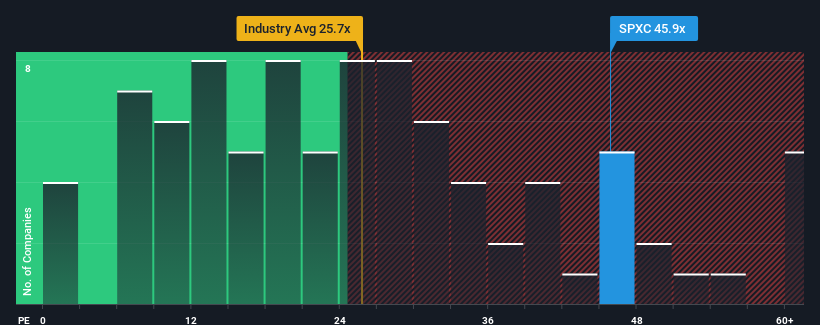With a price-to-earnings (or "P/E") ratio of 45.9x SPX Technologies, Inc. (NYSE:SPXC) may be sending very bearish signals at the moment, given that almost half of all companies in the United States have P/E ratios under 19x and even P/E's lower than 11x are not unusual. However, the P/E might be quite high for a reason and it requires further investigation to determine if it's justified.
SPX Technologies certainly has been doing a good job lately as it's been growing earnings more than most other companies. The P/E is probably high because investors think this strong earnings performance will continue. If not, then existing shareholders might be a little nervous about the viability of the share price.
See our latest analysis for SPX Technologies

Is There Enough Growth For SPX Technologies?
There's an inherent assumption that a company should far outperform the market for P/E ratios like SPX Technologies' to be considered reasonable.
Taking a look back first, we see that the company grew earnings per share by an impressive 99% last year. Pleasingly, EPS has also lifted 96% in aggregate from three years ago, thanks to the last 12 months of growth. Therefore, it's fair to say the earnings growth recently has been superb for the company.
Shifting to the future, estimates from the six analysts covering the company suggest earnings should grow by 37% over the next year. Meanwhile, the rest of the market is forecast to only expand by 15%, which is noticeably less attractive.
With this information, we can see why SPX Technologies is trading at such a high P/E compared to the market. It seems most investors are expecting this strong future growth and are willing to pay more for the stock.
The Bottom Line On SPX Technologies' P/E
It's argued the price-to-earnings ratio is an inferior measure of value within certain industries, but it can be a powerful business sentiment indicator.
As we suspected, our examination of SPX Technologies' analyst forecasts revealed that its superior earnings outlook is contributing to its high P/E. At this stage investors feel the potential for a deterioration in earnings isn't great enough to justify a lower P/E ratio. It's hard to see the share price falling strongly in the near future under these circumstances.
It's always necessary to consider the ever-present spectre of investment risk. We've identified 1 warning sign with SPX Technologies, and understanding should be part of your investment process.
You might be able to find a better investment than SPX Technologies. If you want a selection of possible candidates, check out this free list of interesting companies that trade on a low P/E (but have proven they can grow earnings).
New: Manage All Your Stock Portfolios in One Place
We've created the ultimate portfolio companion for stock investors, and it's free.
• Connect an unlimited number of Portfolios and see your total in one currency
• Be alerted to new Warning Signs or Risks via email or mobile
• Track the Fair Value of your stocks
Have feedback on this article? Concerned about the content? Get in touch with us directly. Alternatively, email editorial-team (at) simplywallst.com.
This article by Simply Wall St is general in nature. We provide commentary based on historical data and analyst forecasts only using an unbiased methodology and our articles are not intended to be financial advice. It does not constitute a recommendation to buy or sell any stock, and does not take account of your objectives, or your financial situation. We aim to bring you long-term focused analysis driven by fundamental data. Note that our analysis may not factor in the latest price-sensitive company announcements or qualitative material. Simply Wall St has no position in any stocks mentioned.
About NYSE:SPXC
SPX Technologies
Engages in the supply of infrastructure equipment serving the heating, ventilation, and cooling (HVAC); and detection and measurement markets worldwide.
Solid track record with adequate balance sheet.
Similar Companies
Market Insights
Community Narratives



